Retail success hinges on one key factor: understanding your customers. Managing customer data, streamlining sales processes, and delivering personalized experiences are essential for standing out in today’s competitive market.
That’s where a retail CRM comes into play. A CRM transforms how you connect with customers and drive sales by centralizing customer information, automating workflows, and providing real-time insights.
Curious how? Stick with us as we dive into the world of retail CRM. We’ll show you how it can streamline your operations, boost your sales, and keep your customers coming back for more. And the best part? With platforms like monday CRM, it’s easier than you might think.
What is a retail CRM?
A retail CRM (Customer Relationship Management) system is a powerful tool designed to help retailers manage customer relationships, streamline operations, and drive sales.
A retail CRM centralizes customer data—such as contact information, purchase history, and interaction details—into one easy-to-access platform. But it doesn’t stop there. A robust CRM also offers features like automation, analytics, and communication tools that allow retail teams to deliver personalized experiences and build stronger connections with customers.
In retail, where customer loyalty is gold, a CRM becomes a critical asset. Here’s why:
- Build stronger customer relationships: A CRM helps you better understand your customers by tracking their buying behaviors and preferences. This means you can deliver personalized offers, tailored recommendations, and timely follow-ups that turn one-time shoppers into loyal customers.
- Enhance the customer journey: From the first interaction to post-purchase support, a CRM provides a seamless experience for customers by keeping every touchpoint connected. No more missed follow-ups or disjointed communication—just smooth, consistent service that keeps customers coming back.
- Optimize operations and increase efficiency: With a CRM, you can automate repetitive tasks, organize customer data, and streamline sales processes. This means your team spends less time on administrative work and more time focusing on what matters—selling and building relationships.
For retail teams, adopting a CRM like monday CRM isn’t just about managing customers—it’s about creating experiences that delight them.
Key functionalities of a retail CRM
A retail CRM like monday CRM offers essential features that empower teams to work smarter, not harder. Here are three key functionalities that make a significant impact:
Lead management
Effective lead management is crucial for turning potential customers into loyal ones. With lead management tools in a retail CRM, you can:
- Capture leads automatically: Gather leads from multiple sources, such as online forms, social media campaigns, or in-store events, and centralize them in your CRM.
- Qualify and nurture leads: Identify high-quality leads with scoring systems and nurture them with personalized email campaigns and follow-ups.
- Automate follow-ups and assignments: Set up automated workflows to assign leads to the right sales team members and schedule timely follow-ups, ensuring no opportunities slip through the cracks.
By streamlining lead management, monday CRM helps retail teams focus on high-impact activities that drive conversions.
Account management
Keeping track of every customer’s journey is essential for providing excellent service and driving repeat sales. With account management capabilities, you can:
- Access 360-degree customer views: See all customer details—past interactions, purchase history, and preferences—at a glance to provide personalized customer experiences.
- Coordinate across departments: Keep your marketing, sales, and customer service teams on the same page by centralizing customer information and communication.
- Log interactions effortlessly: Track every email, call, and meeting with automatic logging, so your team always knows the next best step.
monday CRM’s account management tools ensure you’re always one step ahead in delivering what your customers need.
Sales forecasting
Knowing where your sales are heading is crucial for making informed decisions and staying competitive. Sales forecasting features in a retail CRM enable you to:
- Predict sales trends accurately: Use historical data and predictive analytics to forecast sales trends and plan inventory, staffing, and marketing strategies effectively.
- Monitor performance in real time: Compare actual sales against forecasts to identify gaps, adjust strategies, and optimize team performance.
- Allocate resources efficiently: Make data-driven decisions about where to invest time and money, ensuring you’re always ready for what’s next.
With sales forecasting tools from monday CRM, retail teams can gain visibility into their sales pipeline, make smarter decisions, and stay agile in a rapidly changing market.
Top 10 retail CRM software
Choosing the right CRM can make all the difference for a retail company aiming to boost customer relationships and streamline operations. Below is a summary table of the top 10 retail CRM software options, highlighting what each platform is best for and their starting prices.
| CRM Platform | Best For | Starting Price |
|---|---|---|
| monday CRM | Customizable workflows | $12/seat/month |
| Freshsales | AI-powered lead scoring | $15/user/month |
| Pipedrive | Visual sales pipeline management | $14.90/user/month |
| Hubspot | Inbound marketing integration | $45/month |
| Zendesk Sell | Unified sales and support tools | $19/user/month |
| Pipefy | Workflow automation for small teams | $24/user/month |
| Salesforce Essentials | Comprehensive sales features | $25/user/month |
| Copper CRM | Google Workspace integration | $25/user/month |
| ActiveCampaign for Sales | Email marketing and automation | $9/month |
| Zoho CRM | Customization and scalability | $14/user/month |
1. monday CRM
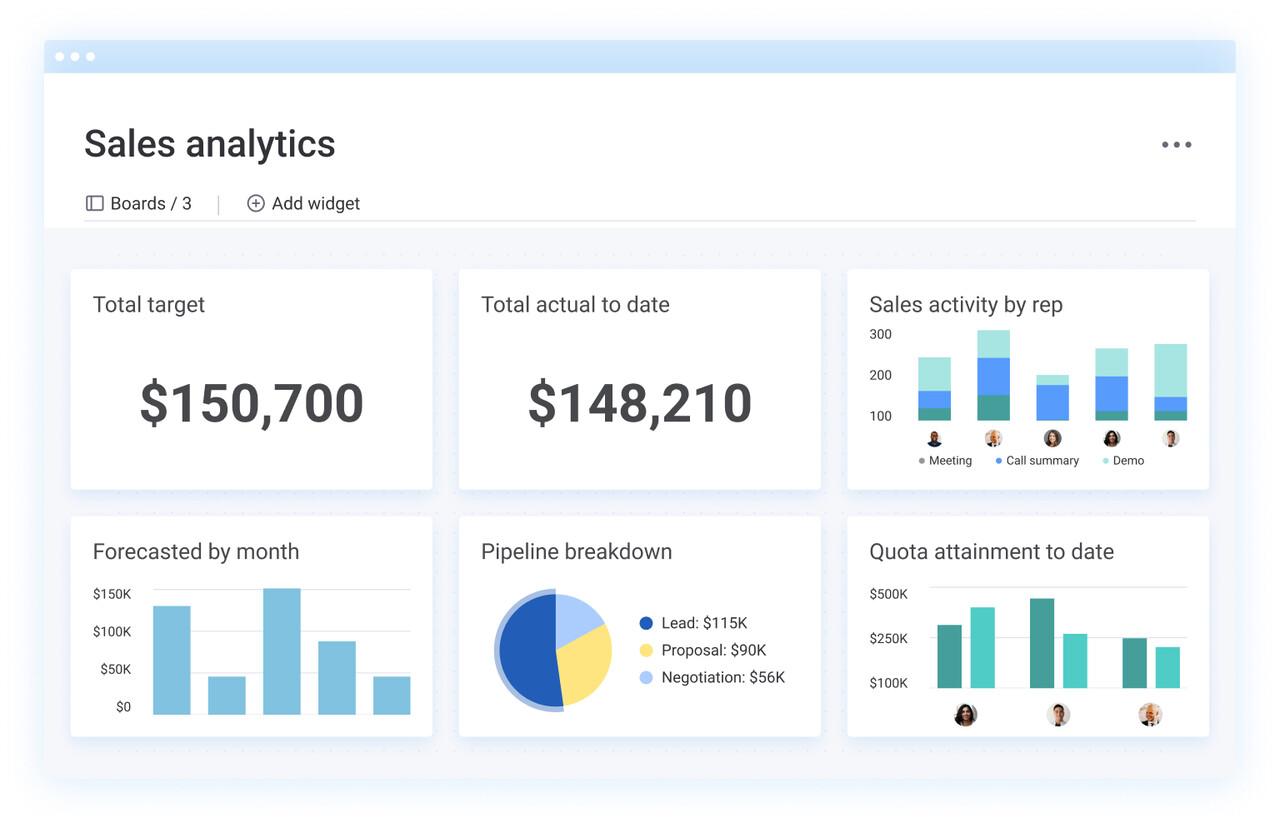
monday CRM is a flexible and highly customizable retail CRM solution designed to streamline sales processes and improve customer relationships. Built on the monday.com Work OS, it allows retail teams to manage everything from lead capture to sales forecasting in one place. Its visual interface and no-code automation tools make it easy for teams to set up workflows that match their unique sales processes.
Best for: Retail teams looking for a CRM that adapts to their specific processes and scales as they grow.
Key features:
- Customizable dashboards and pipelines
- Automated workflows for lead management and follow-ups
- Real-time sales forecasting and analytics
- Seamless integration with popular retail and marketing tools
Pricing: Starts at $12/seat/month.
2. Freshsales
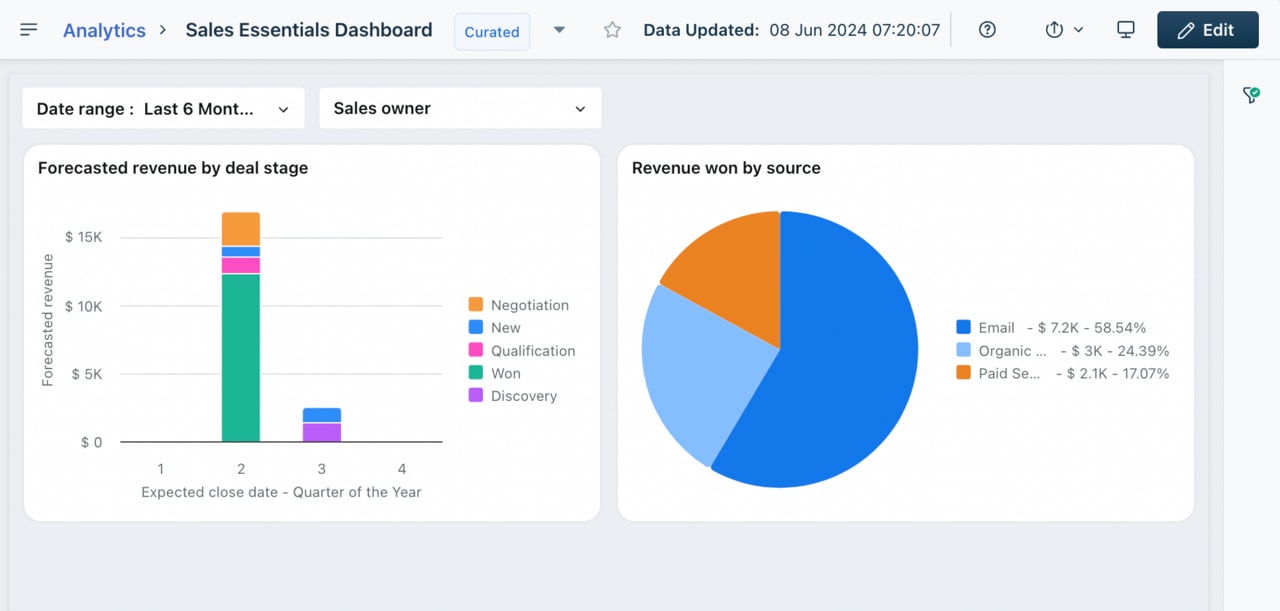
Freshsales by Freshworks is an AI-driven CRM platform that offers advanced lead scoring and automation features. It’s ideal for retail teams that want to prioritize high-quality leads and engage customers with personalized communication.
Best for: Retailers seeking a CRM with strong AI capabilities and lead management.
Key features:
- AI-powered lead scoring and insights
- Built-in phone and email tracking
- Visual sales pipelines with drag-and-drop functionality
- Customizable reports and dashboards
Pricing: Starts at $15/user/month.
3. Pipedrive

Pipedrive is known for its visual sales pipeline, making it a great choice for retail teams that want a clear, straightforward way to manage their sales process. It offers intuitive tools that help sales reps stay organized and focused on closing deals.
Best for: Retail teams that prefer a visually-driven CRM with easy-to-use pipeline management.
Key features:
- Visual sales pipeline with customizable stages
- Automation of repetitive tasks
- Email integration and tracking
- Customizable dashboards for performance tracking
Pricing: Starts at $14.90/user/month.
4. Hubspot
Hubspot CRM provides a comprehensive suite of tools for managing customer relationships, sales, and marketing. It is particularly strong in inbound marketing integration, making it ideal for retailers focused on attracting and nurturing leads.
Best for: Retailers looking for an all-in-one solution with a strong focus on marketing automation.
Key features:
- Marketing automation tools for email campaigns and social media
- Seamless integration with popular e-commerce platforms
- Sales pipeline management with customizable deal stages
- Advanced analytics for tracking sales performance
Pricing: Free tier available; paid plans start at $45/month.
Compare monday CRM vs HubSpot here.
5. Zendesk Sell
Zendesk Sell combines sales and customer support tools in one platform, providing a unified solution for retail teams that need to manage customer relationships across different channels.
Best for: Retail teams needing a CRM that integrates sales and support functions.
Key features:
- Centralized customer communication hub
- Integrated support ticketing system
- Sales pipeline management with custom fields
- Mobile app for on-the-go access
Pricing: Starts at $19/user/month.
6. Pipefy
Pipefy offers workflow automation that is especially beneficial for small retail teams looking to optimize their processes without complex setup. It provides an easy way to manage sales pipelines and customer service tasks.
Best for: Small retail teams seeking simple workflow automation.
Key features:
- Drag-and-drop workflow automation
- Customizable templates for sales processes
- Integration with popular apps and tools
- Automated follow-ups and task assignments
Pricing: Starts at $24/user/month.
7. Salesforce Essentials
Salesforce Essentials is a scaled-down version of Salesforce’s full CRM platform, tailored for small to medium-sized retail businesses. It offers robust sales features without the complexity of the enterprise version.
Key features:
- Customizable dashboards and reports
- AI-powered insights with Einstein Analytics
- AppExchange integrations
- Mobile app for managing CRM on the go
Best for: Retailers looking for a comprehensive CRM with advanced features at an accessible price point.
Pricing: Starts at $25/user/month.
8. Copper CRM
Copper CRM is built specifically for Google Workspace users, making it ideal for retail teams that rely on Google tools like Gmail and Calendar. It offers deep integration and an intuitive interface that mimics Google’s design.
Best for: Retailers who are heavily invested in the Google ecosystem.
Key features:
- Seamless integration with Google Workspace
- Automated data entry from emails and Google services
- Visual pipeline management with customizable stages
- Activity tracking and performance reporting
Pricing: Starts at $25/user/month.
9. ActiveCampaign for Sales
ActiveCampaign for Sales combines powerful email marketing and CRM features, making it perfect for retail businesses that want to automate customer engagement and improve sales processes.
Best for: Retailers who prioritize email marketing and customer engagement automation.
Key features:
- Advanced email marketing automation
- Sales automation with lead scoring and pipeline management
- Custom reporting and attribution
- Machine learning for predictive sending and content recommendations
Pricing: Starts at $9/month.
10. Zoho CRM
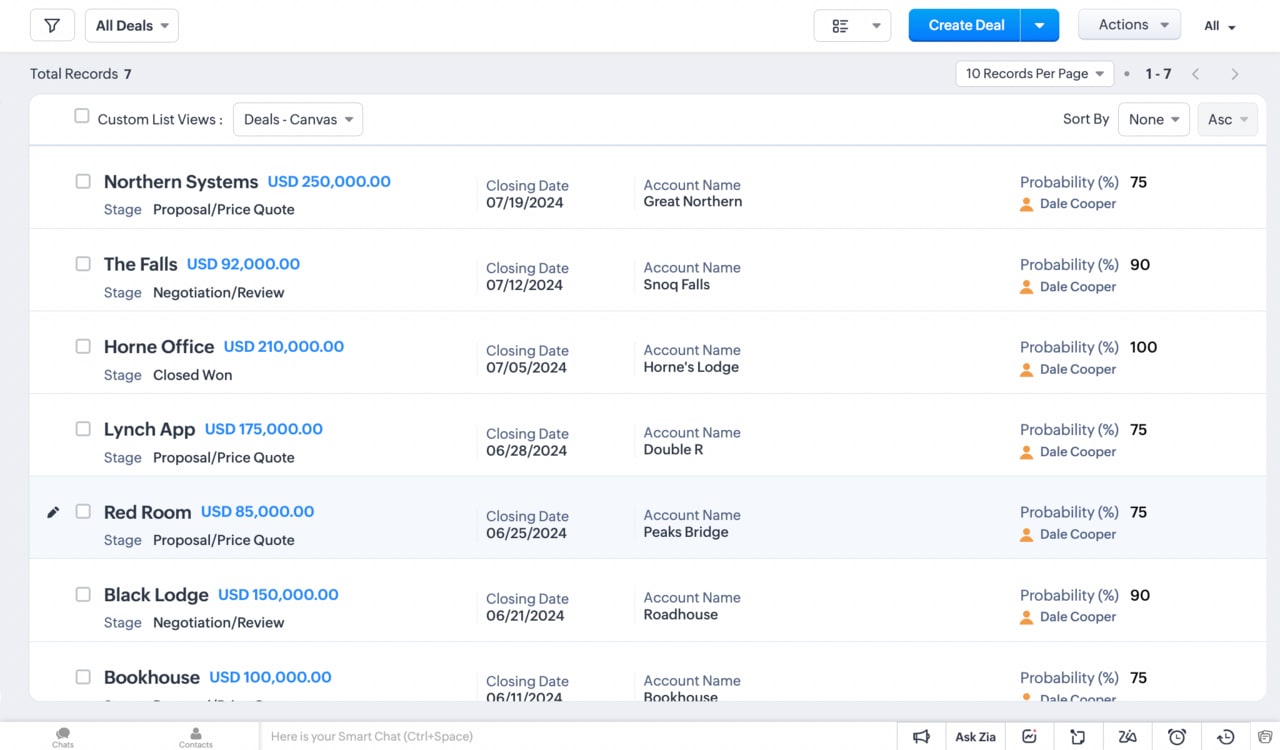
Zoho CRM is a versatile and highly customizable CRM solution that can be tailored to fit the needs of retail businesses of all sizes. It offers a wide range of integrations and features to manage sales, marketing, and customer support.
Best for: Retailers looking for a scalable CRM with extensive customization options.
Key features:
- Customizable modules, fields, and page layouts
- AI-powered sales assistant (Zia) for intelligent forecasting
- Integrated sales, marketing, and inventory management
- Gamification features to motivate sales teams
Pricing: Starts at $14/user/month.
Benefits of using a CRM for retail
A CRM is a strategic asset that transforms how retail businesses interact with customers and manage operations.
Here are the key benefits of using a CRM for retail:
Improved customer data management
A CRM centralizes all customer data—contact details, purchase history, and past interactions—into one accessible platform. This ensures your team always has the most up-to-date information at their fingertips, leading to more personalized customer interactions and better decision-making.
Enhanced communication and collaboration across departments
With all customer data in one place, teams across sales, marketing, and customer service can easily access the information they need. This seamless flow of information improves internal collaboration, reduces miscommunication, and ensures that everyone is aligned toward the same goals.
Streamlined operations and increased sales efficiency
A CRM automates many repetitive tasks—such as follow-up emails, data entry, and scheduling—allowing your team to focus on more high-value activities. By streamlining these processes, your sales team can operate more efficiently, close deals faster, and ultimately drive more sales revenue.
Better customer retention and satisfaction through personalized service
When you know your customers’ preferences, purchase history, and behaviors, you can provide a more personalized shopping experience. A CRM helps you identify opportunities for upselling and cross-selling, tailor marketing campaigns to specific customer segments, and provide timely and relevant offers—all of which boost customer satisfaction and retention.
What features to look for in a retail CRM
Choosing the right CRM for your retail business means looking for features that align with your needs and goals. Here are the essential features to consider:
- Centralized customer information: A good CRM should provide a single source of truth for all customer data, making it easy to access, update, and analyze. This helps your team maintain accurate records and deliver consistent, personalized service.
- Automation of repetitive tasks: Automating routine tasks—like sending follow-up emails, assigning leads, and updating records—saves time and reduces human error. Look for a CRM that offers robust automation capabilities to help your team work more efficiently and stay focused on strategic activities.
- Real-time data and analytics for decision making: Your CRM should offer powerful reporting and analytics tools that provide real-time insights into sales performance, customer behaviors, and market trends. This data-driven approach enables you to make informed decisions, optimize your sales strategy, and respond quickly to changes in the market.
- Integration capabilities with other retail systems: A CRM that integrates seamlessly with your existing tools—such as marketing platforms, e-commerce systems, inventory management, and customer service software—ensures that all your business systems work together smoothly. This integration enhances overall operational efficiency and provides a more unified view of your business.
monday CRM for all your retail needs
For retail businesses looking to elevate their customer relationship management, monday CRM offers a comprehensive, flexible, and user-friendly solution. The wide range of unique features help retail teams manage their entire customer journey—from lead generation to post-sales follow-up—all in one place. Here’s what sets monday CRM apart from other solutions:
Mass emailing and tracking
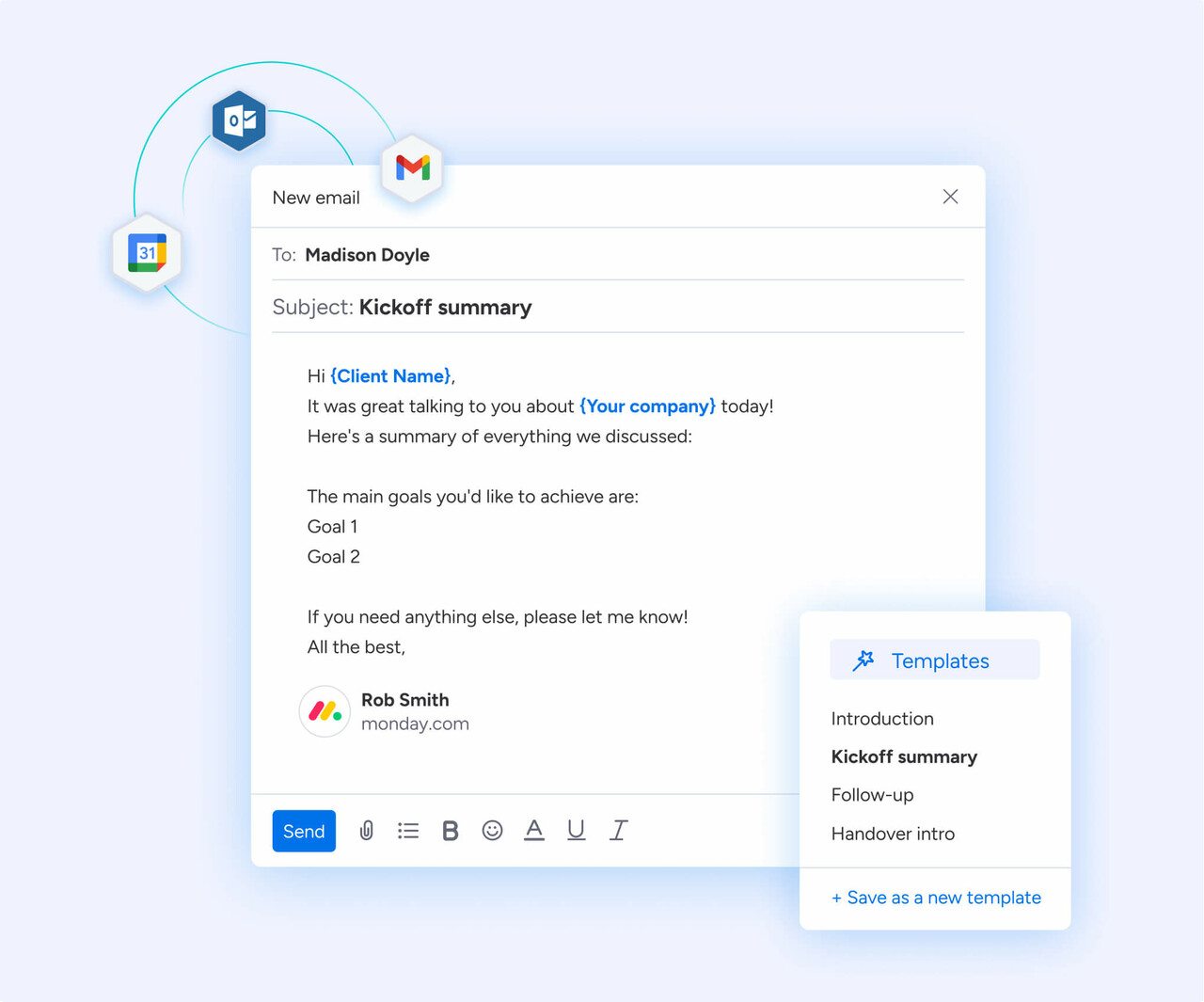
monday CRM enables you to send mass emails directly from the platform, complete with dynamic fields and templates that personalize each message. Track open rates, link clicks, and overall engagement to fine-tune your email marketing strategy and maximize conversions.
Leaderboard and sales funnel widgets
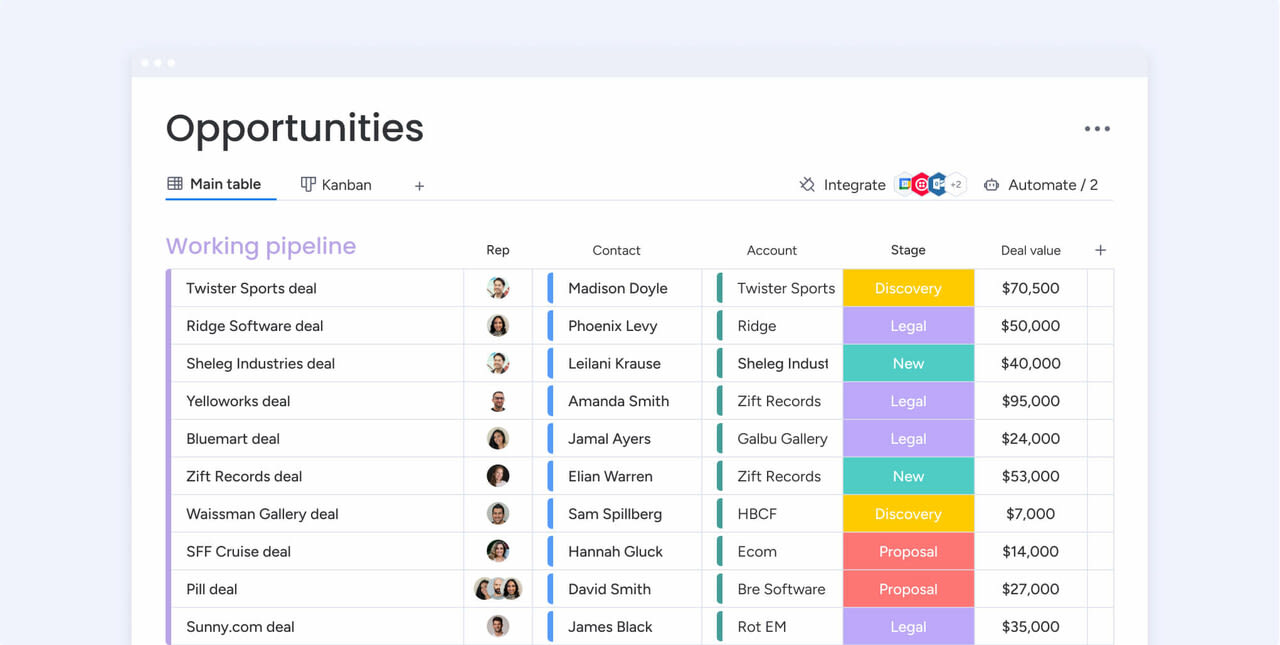
Keep your sales team motivated and on track with built-in leaderboard widgets that showcase top performers. The sales funnel widget provides a clear visual representation of where each deal stands, helping teams focus their efforts on the most promising opportunities and manage their pipeline more effectively.
Dedicated mobile experience
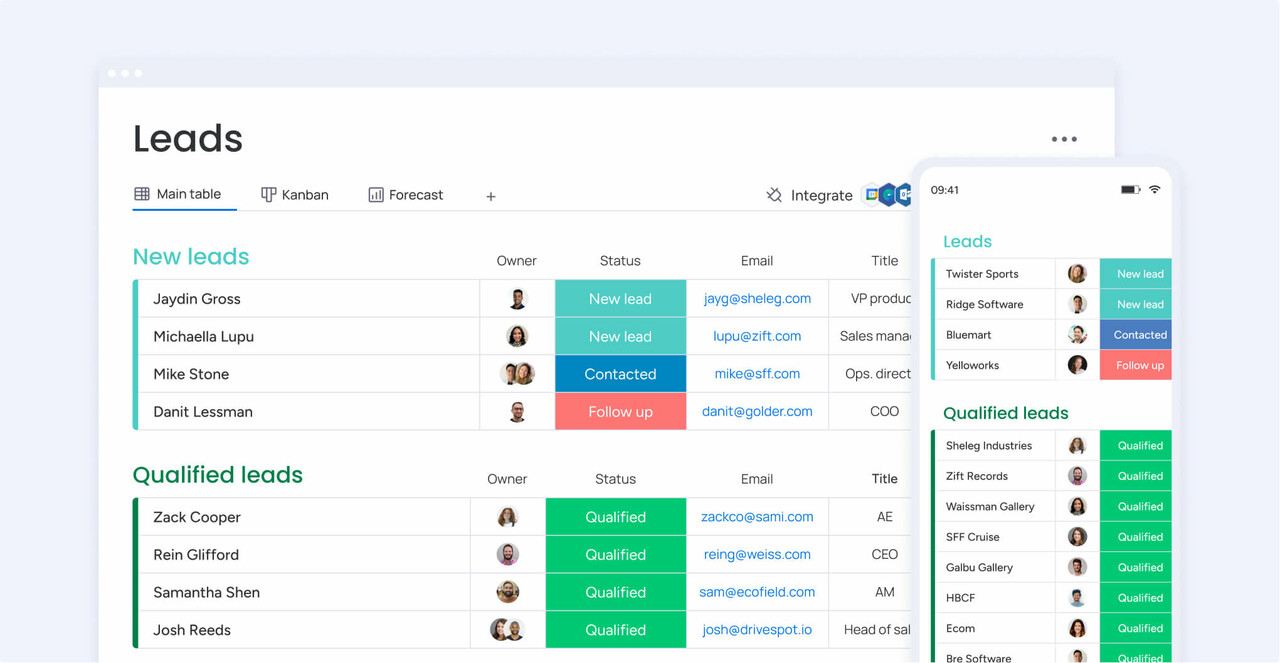
monday CRM offers a fully optimized mobile app that allows sales teams to manage leads, track deals, and access customer information on the go. Whether you’re on the brick-and-mortar sales floor or meeting a client offsite, the mobile experience ensures you’re always connected and ready to make informed decisions.
Conditional label changes that adapt to business processes
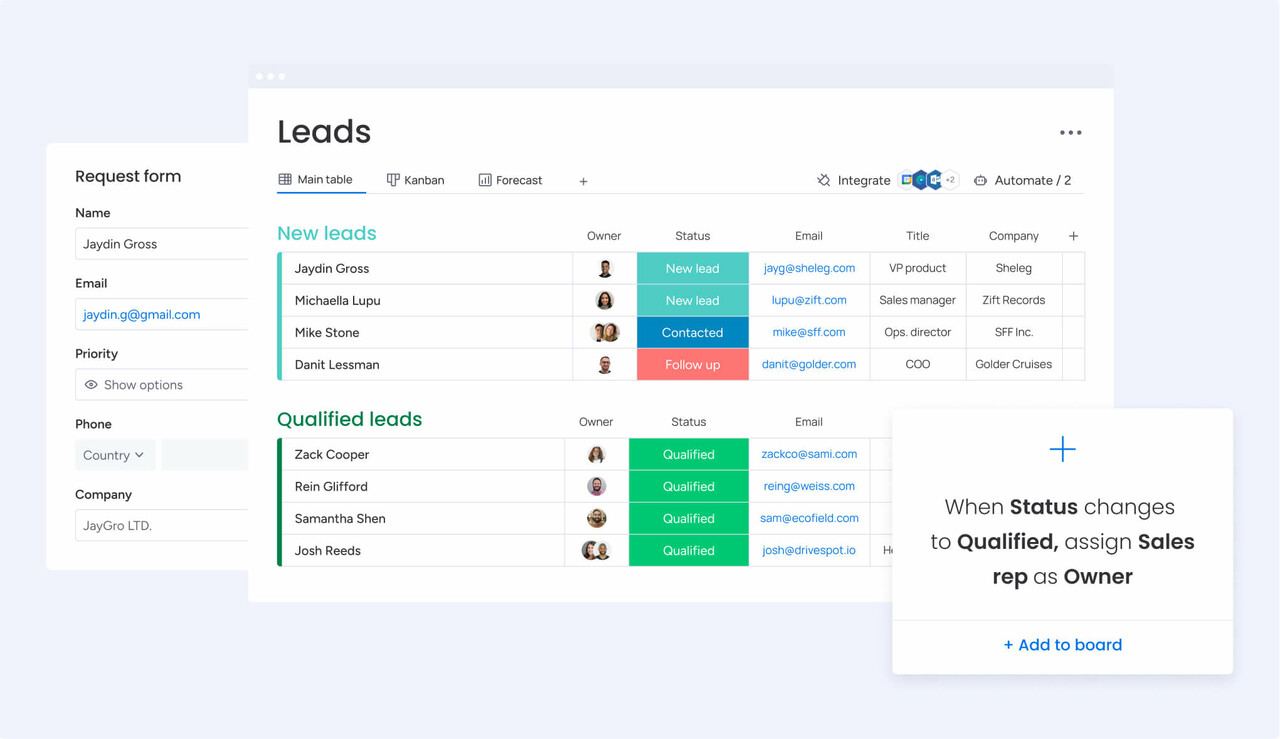
monday CRM’s unique ability to create conditional labels allows teams to automatically update statuses and categories based on specific triggers and conditions. This flexibility means you can tailor the CRM to fit your unique sales processes, keeping everything aligned and organized.
With these features, monday CRM provides retail teams with the tools they need to streamline operations, enhance customer interactions, and drive sales—all while offering the flexibility to adapt as your business grows.
FAQs
What are the primary benefits of using a CRM system in retail?
A CRM system in retail helps manage customer data efficiently, improves communication across teams, streamlines sales and marketing processes, and provides insights through data-driven analytics. This leads to better customer relationships, increased sales, and higher customer retention rates.
How does a CRM help in personalizing customer experiences?
A CRM captures and centralizes customer information—such as purchase history, preferences, and behavior—which allows teams to tailor their communication, marketing campaigns, and sales strategies to each customer. This personalized approach fosters loyalty and improves customer satisfaction.
What should retailers look for when choosing a CRM software?
Retailers should look for a CRM that offers centralized customer information, automation of repetitive tasks, real-time data and analytics, and seamless integration with other retail systems. The CRM should also be easy to use, scalable, and adaptable to the specific needs of the retail industry.
What are the challenges of implementing a CRM in retail?
Common challenges include the initial cost and time required for implementation, getting team members to adopt the new system, data migration from old systems, and ensuring the CRM integrates well with existing tools. However, choosing a CRM that is intuitive and offers robust support can mitigate these challenges.
How do CRM systems handle customer data privacy?
CRM systems are designed with data privacy in mind, incorporating features like role-based access, data encryption, and compliance with data protection regulations (such as GDPR). This ensures that customer data is secure and only accessible to authorized personnel.
How does monday CRM enhance retail operations?
monday CRM enhances retail operations by providing a centralized platform for managing leads, sales, and customer relationships. Its automation features reduce manual tasks, while real-time analytics and customizable dashboards offer actionable insights. With tools like mass emailing, mobile access, and adaptable workflows, monday CRM empowers retail teams to operate more efficiently and effectively.
 Get started
Get started 
